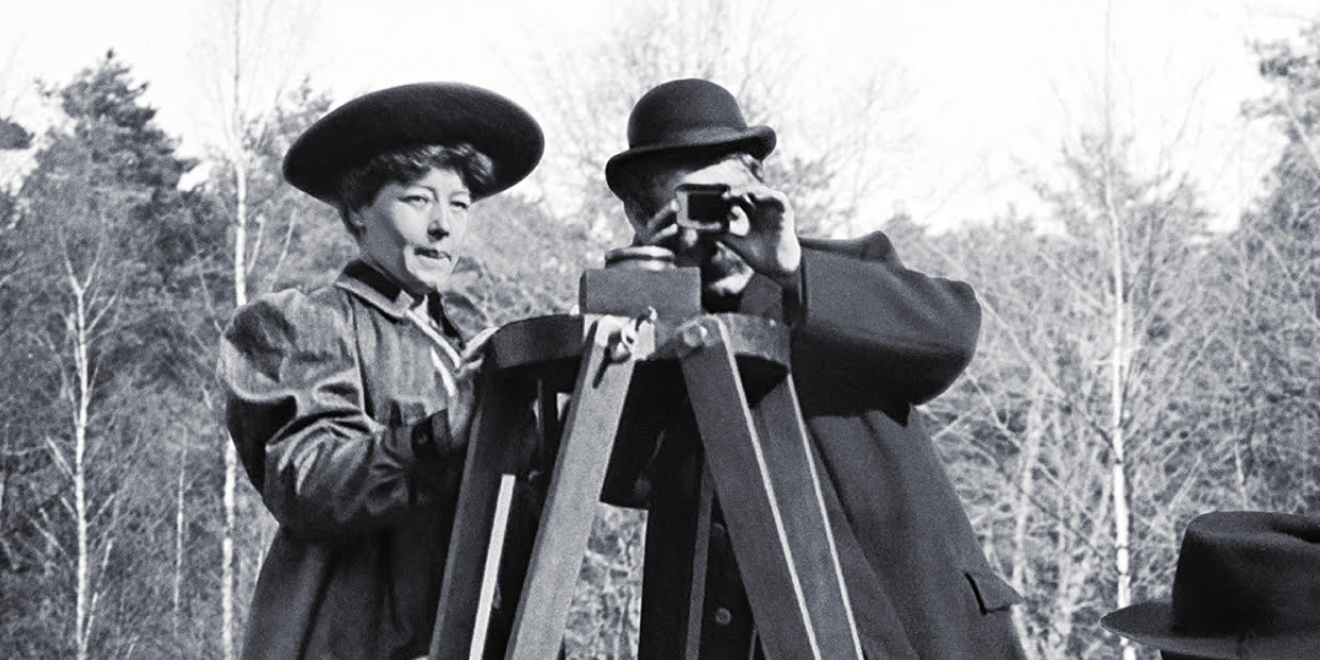
- Industry
Alice Guy, Cinema Pioneer
Alice Guy, the very first woman filmmaker in the history of cinema, was born in Paris on July 1, 1873, to a Chilean father and a French mother. After the death of her father in 1891, she trained as a typist and stenographer to help support her widowed mother and four siblings. In 1895, she landed a job as secretary to Léon Gaumont, and on March 22 of that year accompanied him to the first demonstration of the Cinématographe by the Lumière brothers, Auguste and Louis, which marked the birth of cinema. The Gaumont Company produced motion pictures and her boss allowed his young assistant to direct her original idea, The Cabbage Fairy, in 1896. This distinctly feminine 57-second short shows a beautiful woman pulling babies out of a cabbage patch.
Alice served as Gaumont’s head of production from 1897 to 1906, directing many films, including the big-budget The Life of Christ (1906). She was an accomplished technician of the new medium, introduced close-ups and hand-tinting, and experimented with the Chronophone system for synchronized sound. She helped establish the basics of cinematic language and had an influence on directors like Sergei Eisenstein and Alfred Hitchcock. Hitchcock said: ”I’d be over the moon with the Frenchman George Méliès, I was thrilled by the movies of D.W. Griffith, and the early French director Alice Guy.”
From her experiences as a woman, she presented a female point of view on screen. The humorous Madame’s Cravings (1906) is about a pregnant woman licking a lollipop, drinking absinthe, smoking, and giving birth to a baby in a cabbage patch, the hilarious Consequences of Feminism (1906) shows a role reversal with the men sewing, ironing and pushing baby carriages, while the women drink and smoke at the bar.
In 1907, Alice moved to the US with her British cameraman husband Herbert Blaché (he was 24, she was 33), and had three children, all the while directing films, from dramas like Falling Leaves (1912) to comedies like A House Divided (1913). She continued to express her feminist convictions in films such as Making an American Citizen (1912), in which an abusive immigrant husband learns the hard way not to beat his wife or treat her like a beast of burden. She directed the first film with an all-Black cast, A Fool and His Money (1912).
After divorcing from her philandering husband, she moved back to France in 1922 with her children, but was unable to get work as a filmmaker. She wrote a book, The Memoirs of Alice Guy-Blaché, that was published in 1976, following her death on March 14, 1968.
Alice Guy not only wrote and directed hundreds of silent films, but produced them as well; in 1912 she built her own studio, Solax, in Fort Lee, New Jersey, then the center of U.S. film production before it moved to Hollywood. A huge sign spelling BE NATURAL hung on the wall as advice for the actors.
That is what inspired the title of the documentary Be Natural: The Untold Story of Alice Guy-Blaché, directed by Pamela Green, narrated by Jodie Foster, and executive produced by Robert Redford. It premiered in May 2018 at the Cannes Film Festival, and traveled to other festivals, Taormina, Telluride, Deauville, New York, BFI London. In Los Angeles it was presented by the Annenberg Space for Photography at a virtual event on April 30, 2020. It’s available on all online platforms, from Amazon Prime to iTunes.
Jodie Foster said during a Q&A after the screening of the documentary at the Lincoln Center’s New York Film Festival on October 26, 2018: “I knew absolutely nothing about Alice Guy-Blaché, which is amazing to me, and when Pamela sent me the material, I just couldn’t believe it. That’s what’s so extraordinary about it, that you can spend your life in the movies, you can be a movie director and have no knowledge of it.” Foster, who directed her first film in 1991 at age 26, Little Man Tate, and stated that she had been inspired by Italian director Lina Wertmüller, added: “I wish I had known about Alice Guy at the time, maybe it would have given me more confidence to start off quicker in my directing career.”
At that same Q&A, writer-director Pamela Green said that it was Joan Simon who had suggested Jodie Foster as the perfect narrator, since she was a director and spoke fluent French. Simon had curated the first retrospective of Alice Guy’s films at the Whitney Museum in New York in 2009, which featured dozens of films, including The Great Adventure (1918) starring Bessie Love.
A short by Alice Guy, The Last Supper (1898), is part of the 2022 LACMA exhibit “City of Cinema: Paris 1850-1907.”
Alice Guy-Blaché comes first in the list of women filmmakers honored on the pillars and bridge of the Academy Museum of Motion Pictures in Los Angeles, which opened in September 2021.
After decades of being forgotten, this early pioneer of cinema has finally been given her well-deserved place in film history.

